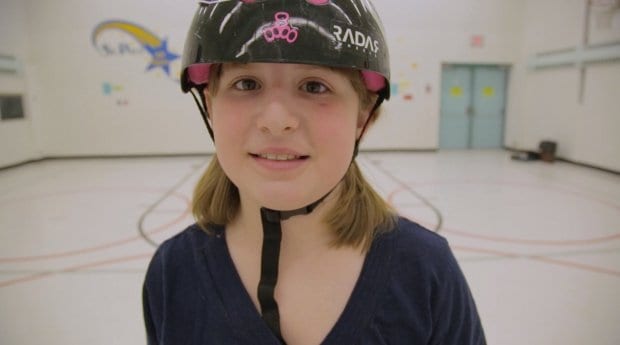Erica Tremblay’s documentary In the Turn follows Crystal, a 10-year-old trans girl who faces bullying and harassment in a small Ontario town. She’s been shut out of school sports but joins the Vagine Regime, an LGBT roller-derby collective, in a tour across the United States.
In this edited interview from 2014, Tremblay discusses her documentary and finding hope through community.
Daily Xtra: How did In the Turn originate?
Erica Tremblay: We put a Kickstarter together [for a documentary about the Vagine Regime] and started filming. We created a small video that had a mix of all the people we were hoping to feature in the film, and two of those individuals were trans skaters. Crystal clicked on the Kickstarter video. Her mom wrote an open letter to the Vagine Regime explaining Crystal’s story. We started a dialogue with Crystal and her mom and we published an open letter. The Vagine Regime community was so amazing, and six months into shooting, Crystal asked if she could be a part of the movie.
What was it like wanting to tell Crystal’s story while being aware of her vulnerability?
The way we approached it was to create a three-minute piece in the beginning that shows the hardship and the result of what severe bullying, homophobia and transphobia have done to Crystal and her family. We made a commitment to the community and ourselves to make a film celebrating queerness, the Vagine Regime, and transgender and queer athletes. We never had the intention to dwell on the negativity. It exists; you hear people talk about those parts of their lives. But for the most part, we wanted to tell the stories of what it means to be a successful queer person, a happy queer person, and how the community is helping these individuals find that.
What are some of the film’s moments that show Crystal’s transformation from a shy, isolated girl to a self-confident athlete?
In the first Skype call I had with her, she said “hello” on a 30-minute call. She was so shy she couldn’t even look into the camera, and her mom did all the talking. Throughout the process of her having conversations with other trans athletes and seeing this outpouring of love, her confidence just grew immensely. I think the largest transformation for me was during the van ride once we left the junior roller-derby camp. This was a girl who did not have access to sports for nearly half of her life, and it was something that she really wanted to have access to. This was the first time she played a sport with peers her own age. She was in the van and she couldn’t stop talking. She was grinning from ear to ear; she was laughing and giggling. You look at that girl compared to months earlier, when she was barely talking.
How was it financially possible for Crystal to tour with the Vagine Regime?
There were a bunch of fundraisers, and it was kind of an interesting process that you see in the film. We’re filmmakers, but we’re also activists and we’re also running the Vagine Regime, so it became this story of us documenting the Vagine Regime raising this money.
When you were 15, your teammates called you a dyke, and you subsequently quit sports. Why are sports often unsafe for LGBT youth?
If you don’t have access to the things that your peers are doing or you don’t feel safe in those spaces, then you’re going to go to something else as an outlet, and sometimes those places aren’t the safest for young people. Access is everything. In the film, Crystal says, “People who are different from other people need to have sports and games to play, too.” From a 10-year-old girl who has faced so much adversity, it pretty much sums it all up.
Bullying is such a buzzword these days. What’s missing from the discussion to address the root causes of bullying and criminal harassment?
It’s interesting to see that as we’re gaining more and more rights, the rhetoric and the violence seems to be amped up a bit because there’s a knee-jerk reaction from the other side to hang on to the status quo. I think it’s still a very scary world. What Crystal, her mother and brother face on a daily basis is frightening and sad. Her mother can’t go to the school board because, frankly, they don’t care and they’re part of the problem. If your educators are refusing to use the correct pronoun in the classroom, how are the nine- and 10-year-old kids going to behave? It’s a systemic problem that isn’t being addressed on multiple levels. What we’re hoping to do with the film is to start that dialogue.
This article first ran on Daily Xtra on Oct 17, 2014.
Canadian Sport Film Festival: In the Turn
Sunday, May 22, 2016, 5pm
TIFF Bell Lightbox, 350 King St W, Toronto
sportfilmfestival.ca/in-the-turn/


 Why you can trust Xtra
Why you can trust Xtra


